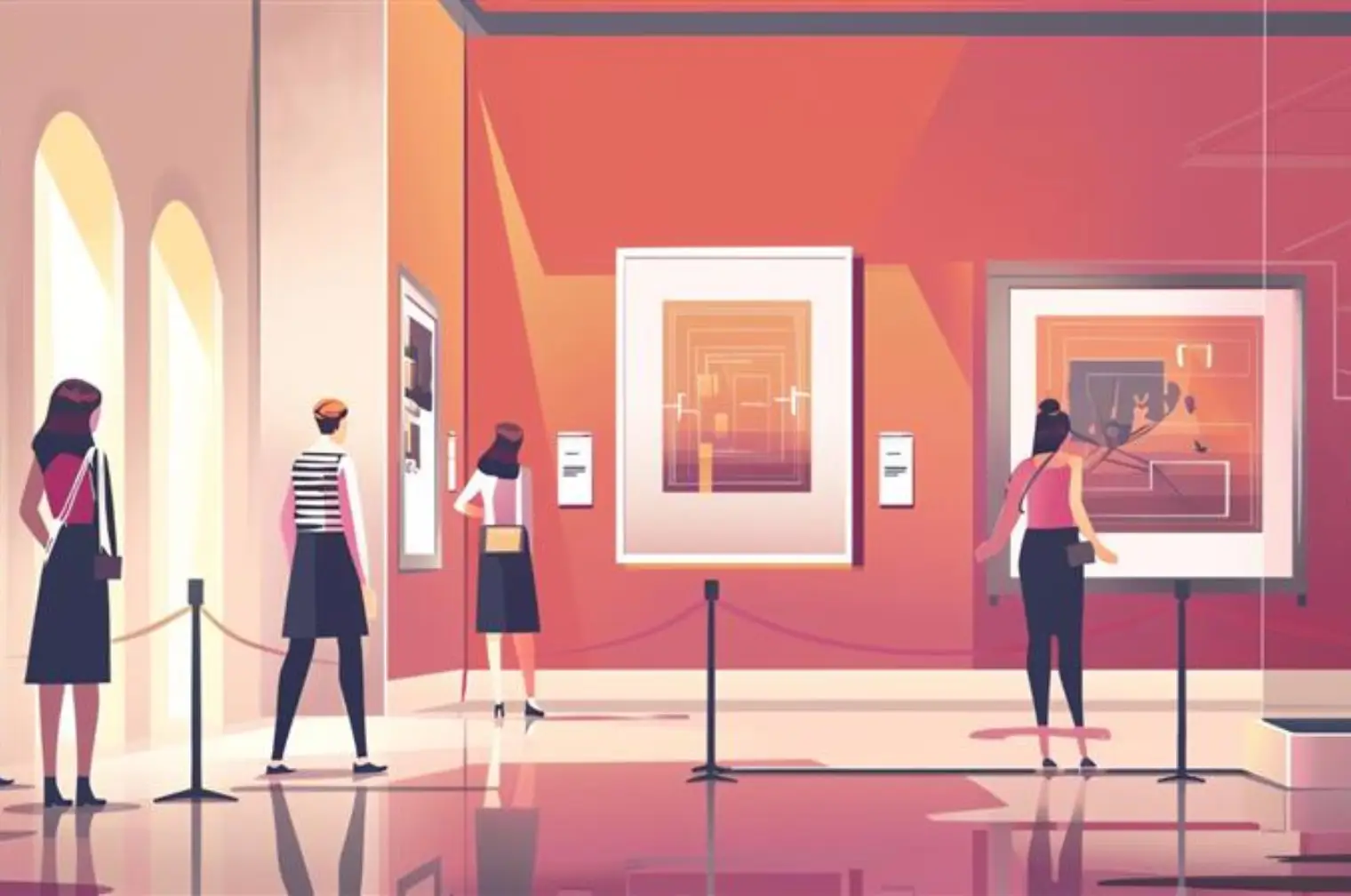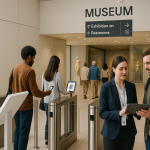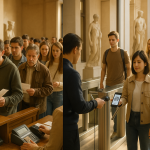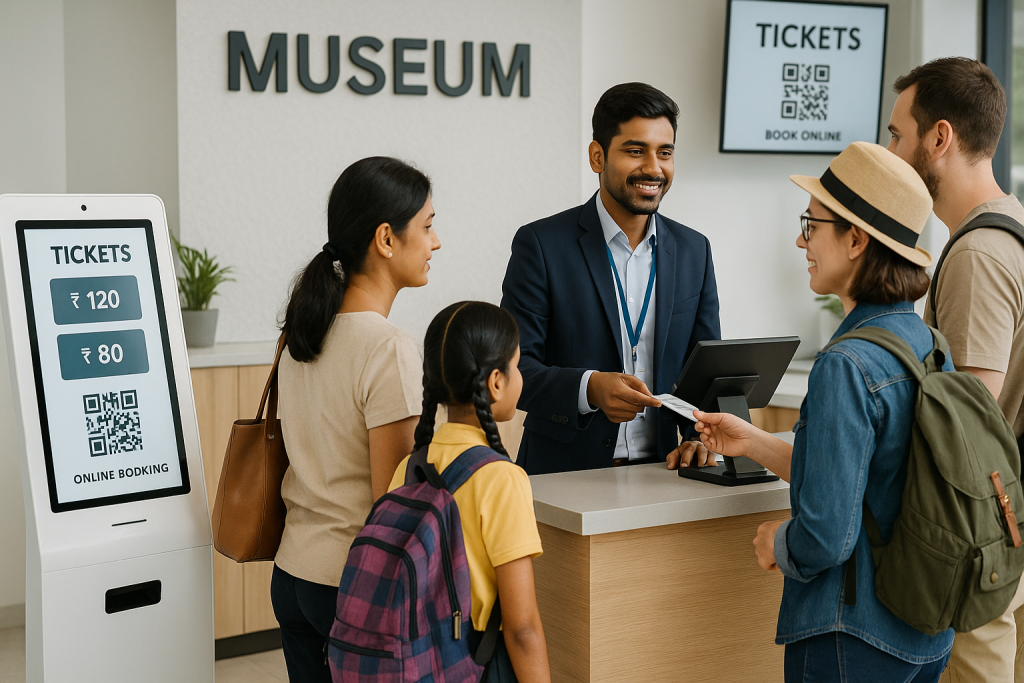Choosing the right ticketing platform for museums should be a clear path to operational efficiency, better visitor journeys, and verifiable ROI. It shouldn’t feel like wading through vendor jargon, add-on traps, and hidden fees.
The smartest route is to evaluate the five important features that directly address real museum challenges like fragmented sales channels, slow entry, poor data visibility, security gaps, and unnecessary costs.
EveryTicket’s ticketing platform for museums is purpose-built around these exact needs with proven adoption across Indian institutions, including tailored tools for online and on-site operations, QR-based admissions, multilingual support, and clear pricing designed to avoid overpaying for features that won’t be used.
Here are the must-have features that deserve attention when selecting a museum ticketing platform.
#1. Unified Commerce: Online, POS, and Kiosk in One Workflow
Modern museums need one platform that handles online bookings, front-desk POS, and self-service kiosks without fragile integrations or duplicate data entry. This ensures no channel is left behind and that visitor volumes can flow across digital and physical touchpoints seamlessly.
EveryTicket provides a cohesive stack, i.e., online ticketing, smart counter solutions, and self-service kiosks. So, it covers web sales, walk-up purchases, QR scanning, and automated printing under a single dashboard, which reduces training time and eliminates reconciliation headaches.
This is especially impactful for museums that want to shorten queues and keep operations running smoothly, even with lean teams.
#2. Fast, Contactless Admissions: QR ETickets and Timed Entry
Long queues and manual checks degrade the visitor experience and strain staff during peak hours. A ticketing platform should deliver QR-based digital tickets, reliable scanning, and timed-entry controls to manage capacity intelligently.
EveryTicket’s QR ticketing and quick scan entry at gates accelerate throughput and reduce friction, while time-slot management controls flow to exhibits and special galleries, cutting congestion and improving satisfaction from door to gallery floor.
Research on museum ticketing also underscores the value of QR eticketing for speed and sustainability, and AI-assisted flows to reduce booking errors and duplication.
#3. Data that Matters: Real-Time Reporting, Visitor Analytics, and CRM
Actionable data is the difference between guessing and growing. A strong museum ticketing system should offer real-time dashboards, revenue tracking, visitor logs, and CRM capabilities that surface repeat visitors, group bookings, and school cohorts—without needing custom BI projects.
EveryTicket’s visitor management system includes built-in analytics and reports, daily/monthly summaries, and visitor tracking so teams can understand patterns, adjust pricing or time slots, and confidently report to boards or funders without exporting spreadsheets every night.
Industry guidance likewise points to analytics, CRM, and membership capabilities as critical evaluation criteria for admissions platforms in 2025.
#4. Indian-Context Reliability: Multilingual UX, Payments, and Low Connectivity
If a platform isn’t designed for the realities of local connectivity, payment preferences, and language diversity, museum teams end up firefighting.
EveryTicket is built for Indian museums with regional language support, multiple payment options, and resilience in low-connectivity environments, so POS and scanning don’t grind to a halt when networks do.
Studies and real-world projects highlight multilingual experiences, real-time availability, secure payment gateway integrations (e.g., Razorpay/UPI), and robust admin tools as must-haves for inclusive, high-uptime operations in India’s museum context.
#5. Payments and Security: PCI-DSS Mindset and Auditability
Cardholder data protection is NON-NEGOTIABLE, particularly when operating both online and at the gate. When comparing vendors, confirm PCI-DSS compliant practices, tokenization support, and encrypted card-present flows where applicable.
Sector leaders outline the baseline: adherence to PCI standards, point-to-point encryption for EMV devices, third-party audits, and never storing raw card data, which significantly reduces risk and compliance burden for museums.
EveryTicket integrates popular, secure payment gateways with multiple methods and a clear architecture that keeps museums away from handling sensitive card data directly while maintaining smooth checkouts for visitors.
Side-by-Side: The 5 Most Important Museum Ticketing System Features
| Feature | What It Solves | What to Verify | How EveryTicket Delivers |
| Unified online+POS+kiosk | Channel fragmentation, double entry, training overhead | Single dashboard, consistent inventories, minimal integrations | Online ticketing, smart counter POS, and self-service kiosks in one platform with real-time inventory and automated printing |
| QR admissions + timed entry | Queue bottlenecks, manual checks, overcrowding | Reliable QR scanning, slot-based controls, fast throughput | QR etickets, quick scan gates, and time-slot management to control flow and reduce wait times |
| Analytics + CRM | Lack of visibility, weak reporting, missed repeat audiences | Real-time dashboards, visitor
logs, revenue, and cohort tracking |
Visitor analytics, daily/monthly reports, CRM-style tracking for repeat and group bookings |
| India-ready operations | Payment friction, language barriers, network issues | UPI/cards/wallets, multilingual UX, offline resilience | Regional language support, multiple payment methods, works in low-connectivity zones |
| Payments + security | Compliance risk, chargebacks, audit gaps | PCI-DSS practices, encryption, tokenization, no raw card storage | Secure gateway integrations and prudent payment handling aligned with industry best practices |
Pricing Clarity: Avoid Overpaying for Features That Don’t Fit or You Don’t Need
A frequent pitfall at the consideration stage is paying enterprise pricing for features designed for stadiums or global attractions, not museums, leading to unused modules and complex onboarding.
EveryTicket’s clear, low-cost pricing, fast setup, and purpose-fit modules let museums adopt exactly what they need now and expand later, preventing shelfware and ensuring a measurable ROI from day one.
Industry guidance also recommends prioritizing easy setup, flexible channel support, and built-in reporting over flashy but rarely used extras.
Buyer’s Checklist
- Confirm the platform runs online+POS+kiosk with a single source of truth to prevent reconciliation errors.
- Test QR scanning speed and timed-entry controls under real visitor volumes; validate low-connectivity behavior at entry points.
- Review analytics depth: daily/monthly revenue, visitor segments, repeat rates, and group/school handling without manual exports.
- Validate multilingual UX and payment options (UPI/cards/wallets) to reduce drop-off and support diverse visitor profiles.
- Request security documentation or attestations aligned with PCI-DSS practices; ensure the vendor never stores raw card data and supports encrypted card-present flows via compliant gateways/devices.
Why Museums Choose EveryTicket in 2025
EveryTicket is built specifically for Indian museums and small-to-mid teams, combining QR-based digital tickets, online+POS admissions, regional language support, built-in CRM and analytics, fast setup, and pricing that keeps TCO in check—all while working reliably in real deployment conditions, not just in demos.
The platform has processed over 100,000+ tickets with growing adoption, and is trusted by leading institutions such as MAP Bangalore, reflecting delivery at scale with measurable outcomes for visitor experience and operations.



